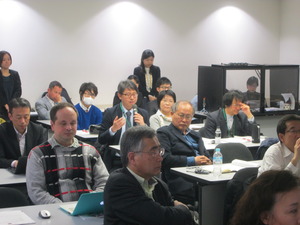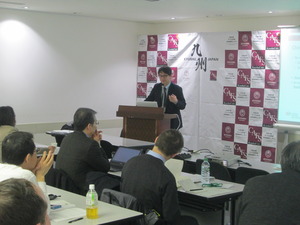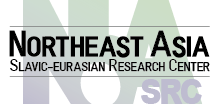On Sunday, February 21, 2016, about 20 scholars from seven countries spent the day in Fukuoka trying to imagine the future of the Asia Pacific, and barring that, at least the shape of the future of Asia Pacific studies. The Center for Pacific Future Studies (CAFS) at Kyushu University was the principle organizer, in cooperation with several faculties at Kyudai, as well as the Slavic-Eurasian Research Center at Hokkaido University.
Karen Eggleston of Stanford University and the National Bureau of Economic Research gave the keynote speech. Dr. Eggleston heads the Asia Health Policy Program at Stanford's Shorenstein Asia-Pacific Research Center and spoke on the "Economic Challenges from the "New" Demographic Transition: East Asia in Comparative Perspective." This talk was keyed to a slide show of up-to-date demographic data from China, Japan and Korea, as well as other selected countries. The New Demographic Transition involves the gains in life expectancy in high income countries, where the elderly are simply living longer, more active lives. Individually, this is great, but for society, this is "graying" and with grave economic implications. Most striking is that Japan, South Korea and China are the world's countries where this phenomenon has hit hardest. Eggleston presented from several recent research reports that offer possible solutions to the challenges of the graying society, including increased investment in human capital, the lengthening of the work career, and the offering of flexible and/or reduced hours to convince working women to have more children.
After that, borders took the stage, first with a historical overview of border studies by Professor Takagi Akihiko (Kyushu U.) followed by a panel on "Rebordering Northeast Asia," chaired by Iwashita Akihiro (CAFS/SRC) that included presentations on: 1) difficult Sino-Japanese relations in, around and about the East China Sea that trace the limits of bilateral relations under present stormy conditions (Masuo Chisako, Kyushu U.); 2) China's construction of a "Near Abroad" under the rubric of "One Belt, One Road" with a deep comparison of the "Belt" part, five countries in Central Asia, with the "Road" part, ten countries in Southeast Asia; (Christopher Len, Energy Studies Institute, National University of Singapore); and 3) An analysis of the Dokdo/Takeshima and Senkaku/Diaoyu through the lens of "ontological security," a method for understanding how the ratification of the Law of the Sea in East Asia in the 1990s together with various other conjunctural turning points in power relations made previously dormant issues about the possession of various "features" in the ocean go viral. Comments were delivered by David Wolff (Slavic-Eurasian Research Center, Hokkaido U.) and Yoo mi Kim (Seoul National U.).
Additional panels dealt with "Migration and Gender" and "Space, Territoriality and International Relations." Every paper dealt with borders or boundaries with theoretical and case studies of migration and integration across international borders, as well as through communal boundaries of gender or sociopolitical systems.



 Eurasia Unit for Border Research (Japan)
Eurasia Unit for Border Research (Japan)




